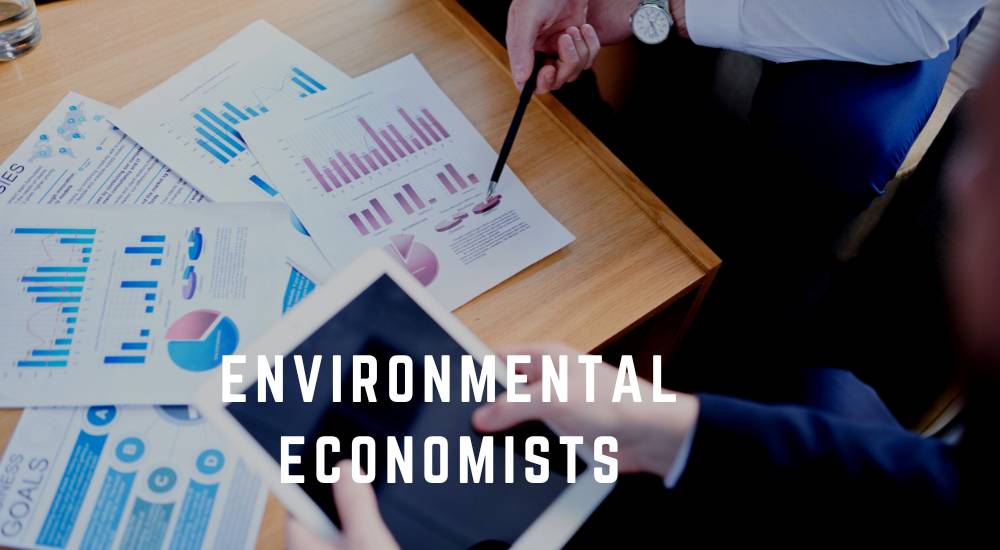Environmental economists analyze the economics of natural resources, including their extraction, utilization, and methods for reintroducing waste materials into the environment. They also discuss how economic incentives can positively and negatively impact the environment and how incentives can be utilized to solve environmental problems.
Environmental economists are finance experts who concentrate on the interrelationships between the economy and the environment. Their primary responsibility is researching the economics of ecological challenges, such as developing new hydroelectric power plants or using renewable energy sources.
They are responsible for collecting new data on environmental and economic policy. The job also includes making predictions about how future environmental sustainability will affect the economy, implementing new economic procedures to support ecological sustainability, and developing financial incentives to encourage people to support environmental sustainability.
Eligibility to Become Environmental Economist
If you wish to pursue your career in environmental economics, you will require an economics/environmental science major. You’ll also need to study relevant applied disciplines such as physics, chemistry, biology, and geology. Understanding statistics is crucial for an environmental economist.
You can also select a program that is specifically dedicated to environmental economics. Some popular options, in this case, include a Bachelor of Science in Environmental Economics and Policy. Depending on your interest and career advancement aspirations, you can also go for a master’s or doctoral degree in a related field of study.
Steps to Become Environmental Economists
Step 1. The first step to becoming an environmental economist is earning a bachelor’s degree. This is because the position often only has a bachelor’s degree requirement, even though most professionals in this field have advanced degrees.
Step 2. A graduate degree is recommended because environmental economists’ job frequently involves analyzing complex economic and environmental topics. Some individuals in this position may enroll in master’s programs because they can often be completed in two to three years and allow students to enter the field rapidly.
Step 3. Obtain work experience; acquiring practical experience in economics may be beneficial after getting an advanced degree. Most employers of environmental economists expect candidates to have prior expertise in the subject to ensure that they can understand the challenging concepts and duties associated with the role.
Step 4. Job applications for environmental economists are encouraged. After a few years of professional experience, you can seek work as an ecological economist. Whether in federal or state-run organizations, the government employs a lot of environmental economists. These experts often work on the activities of examining current economic and environmental regulations and adopting new ones.
Step 5. Work in a reputable organization. There are several different professional organizations that environmental economists might join. When you first enter the field, joining a group can give you access to unique job postings and help you build your professional network.
Courses to Become Environmental Economists
A degree in environmental science will provide you with the theoretical and practical knowledge required to be registered as a professional. The course will specifically emphasize fauna, flora, and biodiversity because it is a specialty degree that blends physiology, ecology, and life science.
Aspirants who wish to work as environmental economists or do research in the future should opt for this program. Numerous colleges offer specialization courses for bachelor’s, master’s, diploma, and doctoral degrees.
Diploma programs- The diploma courses are suitable for aspirants who need to study a subject quickly but still wish to advance their careers.
Bachelor Courses- Many colleges in India provide bachelor’s degrees in environmental science. A bachelor of technology in environmental science is available from a few colleges. After the senior year of high school, one can pursue it.
Masters Courses- Aspirants who want to study advanced environmental science topics. Once a BTech/BSc is completed, this can be pursued. Most universities demand two years.
Doctorate Courses- The program is ideal for students who wish to undertake research aspirants must maintain a solid academic record throughout their careers.
Environmental Economists Jobs’ Profile Details
Ecological Economists – Ecological economists study how ecosystems and economic systems interact.
Energy Economist– Focusing on energy as a subject of analysis, forecasting, and study is the responsibility of an energy economist.
Marine Resource Economist – A marine resource economist focuses on the economics of managing marine resources, maintaining water quality, marketing seafood, and the effects of coastal industry operations.
Natural Resource Economists – Demand, supply, and resource allocation are natural resource economists’ primary areas of study.
Agricultural Economist – An agricultural economist is a specialist in comprehending the economic activity of farming markets.
Principal Research Economist – The principal research economist leads and participates in analytical work concentrating on macroeconomic concerns.
Chief Economist – Financial analysis is created and developed under the direction of the chief economist. It is a vast discipline that covers organizing and coordinating economic research.
Salary of Environmental Economists
An environmental economist can expect a starting salary of about Rs. 6, 15,437 annually. The average income for all economists in 2020 was INR 88,53,300, and ecological economists can anticipate living happily.
The Environmental Scientists has been more common career known in public domain. But with recent studies on Impact to Environment, arising out of pure economic activities gave forth the idea of Environmental Economists. They are not only scientists to advise conservation measures, they also look for striking balance between conservations and economy.
Frequently Asked Questions on Environmental Economists
Ans: Environmental economists analyze the economics of natural resources, including their extraction, utilization, and methods for reintroducing waste materials into the environment.
Ans: There will be a rise in the need for environmental economists, with 5,980 additional positions needed to be filled by 2029.
Ans: Yes, because environmental economics provides many job opportunities in this field.
Ans: No, you need doctoral degrees.
